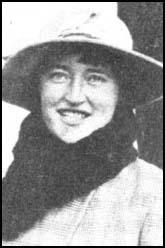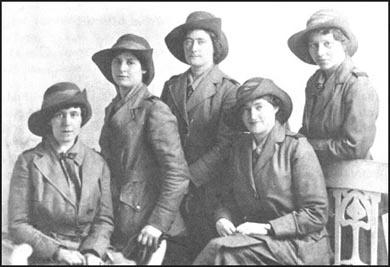Ishbel Ross

Ishbel Ross was born on the Isle of Skye on 18th February 1890. Her father, James Ross, is credited with the development of the famous Drambuie drink. Ishobel attended Edinburgh Ladies College and afterwards worked as a teacher at Atholl Crescent School.
Soon after the outbreak of the First World War Ross heard Dr. Elsie Inglis give a talk on the Scottish Women's Hospital Unit. Inglis was looking for volunteers to accompany her to Serbia. Ross agreed to join Inglis and she arrived in Salonika on 22nd August 1916. She remained on the Balkan Front until July 1917.
Ishbel Ross kept a diary of her experiences and after her death in 1965, her daughter, Jess Dixon, arranged for it to enter the public domain. Little Grey Partridge was published by the Aberdeen University Press in 1988.

in Serbia. Ishbel Ross is the second from the right.
Primary Sources
(1) Ishbel Ross, diary entry while in Salonika (25th August, 1916)
We can hear the guns more distinctly today, it is such a gruesome sound. We have still had no word of moving. I was in town this afternoon with Woody and Adam. We saw a whole regiment of Italian troops marching up Venizelos Street, Cavalry and Infantry. They looked splendid, and one little man standing besides me, I presume he was an Italian, quite lost his head. He was so excited he jumped up and down as if he were on a spring! The troops were cheered by the crowd that always seemed to gather from nowhere when marching feet were heard. It is extraordinary the number of soldiers of different nationalities that you see in the town.
(2) Ishbel Ross, diary entry (7th September, 1916)
What a night we had, we all shivered with cold and had to get up and pace up and down to get warm. We shook hands with a woman soldier in the Serbian Army who came up to the camp to see us. Her name is Milian and she has such a nice face, so sturdy too. She had been fighting for three years and was so pleased to have her photo taken.
(3) Ishbel Ross, diary entry (12th September, 1916)
The bombardment has begun. The guns started at 5 a.m. this morning and have gone steadily ever since. The noise is quite deafening and seems much nearer than it really is. A Serbian officer told us that we are only 5 miles from the fighting. It is awful to think that every boom means so many lives lost. They say the bombardment will continue for four or five days. Some of us went to the top of the hill tonight and saw the flashes from the guns. What a gorgeous night too, with the moon shining and the hills looking so lovely. The thought of so much killing and chaos so near to all this beauty made me feel very sad.
(4) Ishbel Ross, diary entry (19th September, 1916)
The wounded have been coming in all day, nearly all frightfully bad cases. We have our kitchen now, it is like an Indian bungalow all made of rushes. From the window we can see the ambulances arriving at the reception tent, and the poor men carried in. All the Serbs working in the camp are so pleased to have the hospital started at last, and indeed we are too. Poor Ethel is in the surgical ward and has had an awful day of it - three of the men, very badly wounded in the head, died tonight. We get the worse cases here and some of the wounded have been lying untended for two days.
(5) Ishbel Ross, diary entry (24th September, 1916)
A whole regiment of Russians passed by, I never saw some splendid men, quite the finest that have passed yet. They are huge and so handsome! They halted for the night quite near us, and two of the officers came to visit our camp. They talked to us in the kitchen for a long time. One of them could speak English very well.
(6) Ishbel Ross, diary entry (29th September, 1916)
Big guns and troops went by all day, and General Serrail drove by in his car. Colonel Vassovitch came into the camp with an English woman dressed in the uniform of the Serbian Army. Her name is Flora Sandes. She is quite tall with brown eyes and a strong, yet pretty face. She is a sergeant in the 4th Company and talked to us for a long time about her experiences, and the fierce fighting she and the men of her company had to face. We felt so proud of her and her bravery.
(7) Ishbel Ross, diary entry (15th February, 1917)
Mrs Ingles and I went up behind the camp and through the trenches. It was so quiet with just the sound of the wind whistling through the tangles of wire. What a terrible sight it was to see the bodies half buried and all the place strewn with bullets, letter cases, gas masks, empty shells and daggers. We came across a stretch of field telephone too. It took us ages to break up the earth with our spades as the ground was so hard, but we buried as many bodies as we could. We shall have to come back to bury more as it is very tiring work.
(8) Ishbel Ross, diary entry (24th February, 1917)
On Wednesday evening a Serbian, Captain Dimitrivitch took Dr Muncaster and me up to his camp. We went up on a funny kind of waggon as no cars can go on the track. It is only open for the food and ammunition carts going up to the front. It is right along the side of Mount Kajmakchalan, and we saw the trenches and barbed wire entanglements just as they left them. I don't think I realized until then what the Serbs had done. It must be one of the most wonderful things that has happened during the war. Even though they are worn out from years of fighting, tormented by the knowledge that the Bulgars had killed most members of their families, without blankets proper food and clothing, the Serbs will never give up a yard of their country. They must have paid a heavy price for this great bleak mountain.
